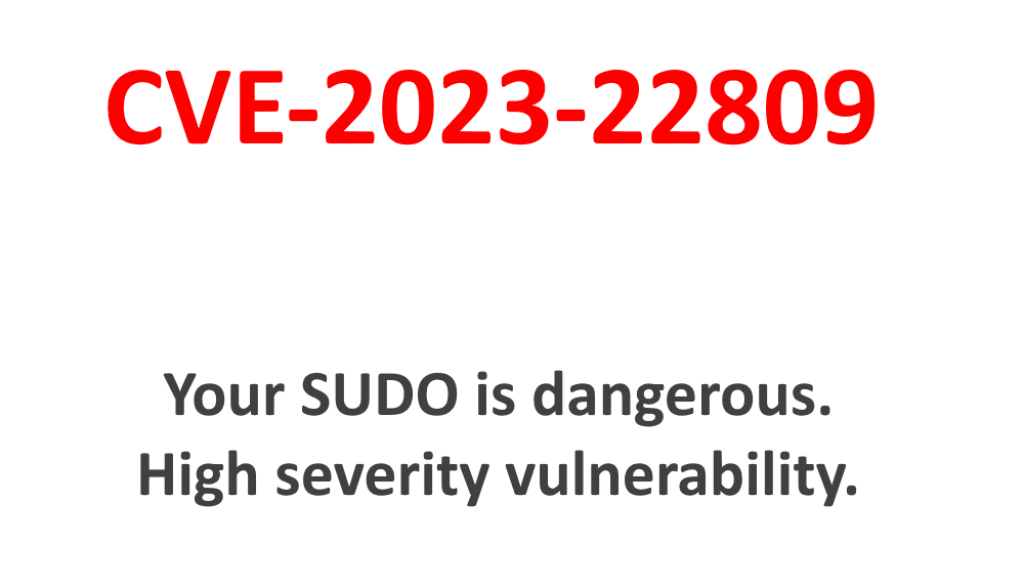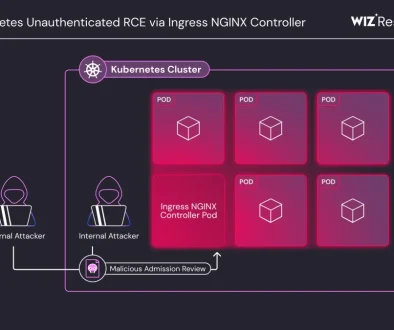CVE-2023-22809 SUDO High criticality Vulnerability
The world of technology is always advancing, with new products and services being developed at a rapid pace. However, with this progress comes new security risks and vulnerabilities, which can leave users and organizations vulnerable to attacks. One such vulnerability is CVE-2023-22809, a critical vulnerability in the popular Unix and Linux utility, sudo.
Sudo is a powerful tool that allows users to execute commands with elevated privileges. It is often used in Unix and Linux systems to manage access to system resources and perform administrative tasks. However, the power of sudo also means that it is a prime target for attackers seeking to gain access to sensitive information or control over the system.
CVE-2023-22809 is a vulnerability that allows an attacker to bypass the intended access restrictions of sudo and execute arbitrary commands with elevated privileges. The vulnerability affects multiple versions of sudo, including the latest version at the time of writing (1.9.7p1), and has been rated as “critical” in severity.
The vulnerability works by exploiting a flaw in the sudoers configuration file, which specifies the users and commands that are allowed to be executed with elevated privileges. By manipulating this file, an attacker can bypass the intended access restrictions and execute arbitrary commands with elevated privileges. This can result in a wide range of attacks, from data theft to complete system compromise.
CVE-2023-22809 is a clear example of how even a widely used and trusted utility like sudo can be vulnerable to attacks. However, there are steps that organizations and individuals can take to mitigate the risk of this and other vulnerabilities.
First and foremost, it is crucial to update to the latest patched version of sudo as soon as possible. The developers of sudo have released a fix for CVE-2023-22809, and users should ensure that they have installed this patch to prevent exploitation.
In addition to patching, it is important to review the sudoers configuration file and ensure that it is correctly configured to limit access to authorized users and commands. This includes removing unnecessary permissions and ensuring that the file is not accessible to unauthorized users.
It is also recommended to monitor for suspicious activity on the system and implement best security practices, such as the principle of least privilege. By limiting the access that users have to system resources and commands, organizations can reduce the risk of attacks and prevent the spread of any potential damage.
While CVE-2023-22809 is a critical vulnerability, it is just one of many potential risks that organizations and individuals face in the world of technology. As such, it is crucial to stay informed and up-to-date with the latest security threats and vulnerabilities.
One way to do this is by participating in the security community, which includes organizations such as the CVE Program, which assigns unique identifiers to known vulnerabilities. By sharing information and collaborating with others in the community, organizations can stay ahead of emerging threats and work together to develop effective security strategies.
In addition to participating in the security community, it is also important to invest in ongoing education and training for employees. This can include regular security awareness training and courses on best practices for managing and securing technology assets. By equipping employees with the knowledge and skills needed to identify and prevent potential threats, organizations can reduce the risk of attacks and minimize the impact of any potential vulnerabilities.
In conclusion, CVE-2023-22809 is a critical vulnerability in the popular Unix and Linux utility, sudo, which allows attackers to execute arbitrary commands with elevated privileges. The vulnerability highlights the importance of staying informed and up-to-date with the latest security threats and vulnerabilities, as well as implementing best security practices and collaborating with the security community. By taking these steps, organizations and individuals can mitigate the risk of CVE-2023-22809 and other potential vulnerabilities, and continue to use technology in a safe and secure manner.
Sources:
https://www.sudo.ws/security/advisories/sudoedit_any/
https://nvd.nist.gov/vuln/detail/CVE-2023-22809
POC:
https://medium.com/@dev.nest/how-to-bypass-sudo-exploit-cve-2023-22809-vulnerability-296ef10a1466



